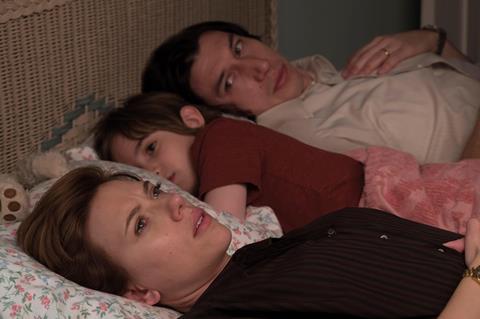Separating couples are increasingly asking to be represented by the same solicitor. Those involved believe this ‘one lawyer’ service could be the future – and not just for family law
In the 2019 film Marriage Story (pictured), the divorce lawyer trope was all too familiar: a fragile and vulnerable couple are goaded and encouraged by their lawyers to create conflict. But the reality is often different, and for many separating partners the aim is to have as amicable and frictionless a breakup as possible. Increasingly those clients are asking their lawyer: can you represent us both?
Prompted by the advent of ‘no-fault divorce’ this year, a handful of firms are now offering a ‘one lawyer’ approach – and finding that many clients like the idea. ‘Couples seem genuinely happy and enthusiastic that this is now an option,’ said Jo O’Sullivan, owner of Brighton firm O’Sullivan Family Law and author of (Almost) Anything But Family Court.

O’Sullivan estimates that 20% of enquiries are now from couples wanting joint and neutral representation to sort out a financial settlement, arrangements for their children, and where necessary to obtain an order from the court. ‘I don’t want to overstate it but this might be the way separation is done in the near future,’ O’Sullivan said.
David Lister, head of family law at national firm Simpson Millar, helped to launch Separating Together before no-fault divorce was implemented and says the service has been 100% successful so far. The five-step, fixed-price process includes an initial assessment; discussion of the scope, timescales and expectations; information-gathering; agreement; and paperwork prepared and submitted to the court.
Lister believes the approach removes the risks of going to court and gives clients certainty, as well as doubling the potential client base at the same time. But he cautions that parties need to be open and transparent, coming to the table ‘with their cards facing up’.
He said: ‘Naturally, confidentiality is maintained outside of the case, but within it everyone sees and hears everything that’s said. It ensures a level playing field. Most importantly, there’s no room for power imbalance. Assessments need to be done at the very beginning to ensure one party isn’t being placed under duress, and that there hasn’t been domestic abuse that would create a situation whereby one party could be intimidated or taken advantage of.’
'Couples seem genuinely happy and enthusiastic that this is now an option… I don’t want to overstate it but this might be the way separation is done in the near future'
Jo O’Sullivan, O’Sullivan Family Law
Claire Blakemore, family partner at international firm Withers, said the benefits of its Uncouple service are clear. ‘Rather than two sets of lawyers pulling a couple further apart by having to make competing offers, they work with their lawyer to identify what they can agree on and work through more difficult issues,’ said Blakemore.
The service is more flexible than mediation, she said, drawing on other forms of dispute resolution such as neutral evaluations and arbitration, and using specialist advisers on property valuations, tax and pensions without having to work with them in the court process.
Lawyers are acutely aware of the obvious issue that arises with working for both parties. But these early adopters have been conscious of their regulatory and moral obligations and are careful to navigate a path that satisfies both.
Alison Bull (pictured, inset) family lawyer with national firm Mills & Reeve, ensures that all clients have given informed consent, with effective safeguards in place to protect confidential information. ‘There are lots of things that we need to do to make sure we are compliant,’ she said. ‘But most important is to have effective individual meetings with each of the clients before they sign up to the process, to ensure that there is no domestic abuse of any type that means the process is not appropriate, and also that both are committed to providing full and frank financial and factual disclosure.’
And it is likely the ‘one lawyer’ service will spread. Family justice body Resolution is unveiling a new model helping its members to represent couples and take unnecessary conflict out of the picture.
The organisation says its new model, likely to be launched later this summer, will work within current regulations around acting where there is a risk of conflict, following talks with the Solicitors Regulation Authority about compliance. The Gazette understands that the regulator is happy with the idea in principle and keen to encourage anything that might reduce costs and widen access to justice.
The ‘one lawyer’ solution might ultimately have a profound impact on civil justice in general. The law in England and Wales has gradually moved away from the adversarial approach and adopted one of alternative dispute resolution based on consent and independent arbitration. If a divorcing couple can push past the emotion and stress to work together on an outcome, in theory couldn’t any litigant?




































11 Readers' comments